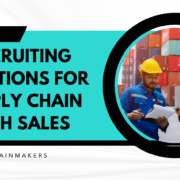How To Build A Successful Sales Team From Scratch: Going From 0-10 Employees, FAST!
Building A Successful Sales Team
In this series, How to Build a Sales Team from 0-10 employees, we review how early-stage software companies can go from having a tiny or non-existent sales team to having a large, organized, and revenue-generating sales team. Specifically, we’re writing for CEO’s with little sales experience or new sales managers of small startups.
There are many parts to building a successful sales team. You need to hire right, put the proper procedures into place to make your team successful, provide your sales team with the appropriate business development/marketing support, etc. For the first part of our series, we’ll focus on hiring right because we believe this is essential to creating a successful sales team.
If you have a product market fit and talented/hardworking salespeople, you can do many other things wrong and still see substantial revenue growth.
Which Roles Should You Hire First?
In most cases, your first two sales hires should be two Account Executives.
They will be ‘full cycle’ AE’s handling the business relationship from beginning to finish.
There are many career paths for an AE, but in this case, they will essentially be an SDR, AE, and AM simultaneously.
You do this for a few reasons:
- Hiring only one AE removes competition from the sales process and disables you from seeing any ‘average’ performance levels.
- Before hiring SDRs to book meetings for your AE’s, you must ensure you have AE’s that can close deals.
For more information on this very early stage of hiring, we recommend you watch Danny Leonard from 500 Startups speak about this process.
Danny notes that for these early AE’s, you need particularly hungry, entrepreneurial, aggressive salespeople who can pursue new business in a new market with a product with little brand recognition. This is likely a different type of employee than a highly polished and refined salesperson you’ll hire as your company grows.
After your AE’s are consistently closing deals, NOT BEFORE, you can start to scale your sales team. An initial scaling will look something like going from 2 AE’s to 3 AE’s and 2 to 3 SDR’s.
By the way, hiring for SDRs is a different ballgame. Great SDRs will certainly have adjacent skills to AEs, but they are not necessarily the same.
Once you have 3 AE’s, you can begin to have a good idea of performance baselines. Here’s what you should see (again, if you have a product-market fit):
Exceptional AE’s will close up to 45% of opportunities in their pipeline
Decent AE’s will close 20-30% of opportunities in their pipeline
Poor AE’s will close less than 15% of opportunities in their pipeline and should be fired
Ideally, you want to foster a culture of excellence in your company and have all AE’s performing exceptionally. You’re doing a swell job if you have two decent and one exceptional AE on your sales team.
Once your sales team is at 5 or 6 people, if your company doesn’t have a sales leader, it’s time to hire one. There are two choices, hiring an experienced external leader or promoting your most talented AE to the role.
According to Auren Hoffman (serial entrepreneur with over 1B in exits), companies hire externally for leadership because they want to import the culture of other companies (they want to be like Google or Oracle, so they hire sales managers from there). If you want a pure culture (this is the route Auren seems to prefer for his own companies), you promote internally.

Post Sales Leadership – Hire For Growth
Now that you have a sales leader, you should hire conservatively more salespeople. On the other hand, if you have three good AE’s, there’s no need to hire more unless they all have full calendars. If they don’t have full calendars, it’s more important to find out how to earn more leads before hiring more salespeople.
In other words, improve the SDR team’s output or improve marketing efforts before hiring more AE’s. Unfortunately, companies hire too many AE’s and then have to divide the opportunities so much that no AE meets their quota. This is bad for morale and financially inefficient.
Think about your AE’s as conversion rates — and know that they only have value in proportion to the opportunities the company can feed them.
How To Hire For Your Fast Growing Sales Team
Hiring for a sales team is hard, especially if you don’t come from a sales background. You have to hire based on the individual level (will this person perform well?) and group level (will these people work well together to accomplish goals as a team?).
We’ve detailed two criteria you can use to evaluate candidates, with clear-cut guidelines to help make your hiring decisions more straightforward.
We think you should focus on:
- Sales Talent (for individual success)
- Diversity (for the success of the team)
How To Identify Sales Talent
Sales talent is different from other kinds of talent. It’s not the talent of a software engineer or symphonic pianist. Instead, good SaaS salespeople must be effective communicators, socially strategic, technical, hardworking, and patient.
Here’s a good breakdown of evaluating sales talent:
Intelligence:
There are a lot of stereotypes about good salespeople being the former high school popular kid who gets B minuses and C pluses. For good software salespeople, this couldn’t be further from the truth. Your company needs intelligent salespeople. Can you evaluate this by looking at what school a candidate went to and what grades they got? This might help a bit, but assessing intelligence through a conversation during the interview is better.
Here’s a great question to ask to evaluate intelligence and its favorite mega-investor Peter Thiel.
“What is an opinion you have the most other people disagree with?”
An intelligent person can respond thoughtfully because smart people think outside the box.
Ability To Learn (And Be Coached):
Often this is referred to as ‘coachability.’ But what happens if you’re a CEO with no sales experience hiring your first two AE’s? In this case, you need salespeople who can recognize their own mistakes and areas to improve and figure out how to do better. In addition, we’ve found that salespeople who are naturally curious and humble can learn from others (management, coaches, peers) and their experience. So, again, this is something you need to hire for.

Hunger, Hustle, Heart:
Is this person going to work hard enough to foster a culture of competitiveness on my team and drive revenue? You can evaluate this by asking about career goals (people with high ambitions want to beat the competition to make it to the top). People who played sports in high school or college typically fit this criterion, but so do candidates who did not. You’ll have to go with your gut on this one for the most part.
Hiring For Diversity
We think diversity is perhaps the most critical component of having a successful sales team. This is true for driving revenue, as sales teams with diverse backgrounds can pursue a wider variety of accounts. It’s even more critical for internal culture, however, as groups that lack diversity often form cliques, and the development of cliques at a startup is highly counterproductive.
We think you should try your best to hire the following kinds of diversity when building your early sales team:
Gender diversity:
Study after study has concluded that sales teams with a sizable portion of women almost consistently outperform their male-dominated counterparts. In addition, for various reasons (perhaps being more empathetic generally), women are typically 5% more likely to close a deal than male salespeople.
Cultural diversity:
Having a mixture of cultural backgrounds at a company is vital to having a strong ‘company culture.’ The more backgrounds there are, the more perspectives and ideas permeate the company. This promotes individualism and creativity and prevents ‘group thinking.’ As a result, there are massive opportunities to sell SaaS in Asian and Latin American markets that require salespeople from those backgrounds.
Experience diversity:
As we mentioned earlier, it is essential for early sales hires to be aggressive and hungry. Unfortunately, this often means hiring salespeople with less experience than usual who can ‘grow with the company. However, when a company starts selling large contracts to Fortune 500 companies, it will likely need to hire more experienced sales reps who have done something similar. That being said, with a mixture (for example, one experienced rep and two less experienced), the experienced rep can coach the newer ones while the newer ones keep the experienced rep hungry and on her toes.












